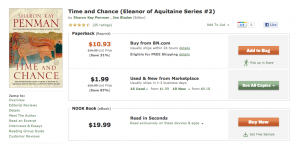As I mentioned in a previous post, I got a Nook a couple of months ago. My first impression of the Nook was somewhat negative – I had hoped it would be useful as an academic tool, allowing me to easily read pdfs and comment on them. My thoughts about the academic application of the Nook remain unchanged, but I have to admit that I’m growing to like it as an e-reader for non-academic books. But while I love the Nook for its portability, I sometimes miss the feel of a book in your hand – not to mention the ability to easily flip backwards when new plot point encourages me to think about something in a new way.

However, another selling point of an e-reader was the idea that digital books should be cheaper. Naively, I assumed that the savings inherent in a digital copy – both in terms of printing materials and storage costs – would be passed on to me. So imagine my surprise when the second and third book of a series that I’m reading (which if you like historical fiction, I’m absolutely adoring Sharon Kay Pennman – but that’s another post!) cost twice as much in the digital format as the paperback, and almost $9 more than the hardcover! Further, the cost of the digital copy was the same, regardless of whether I bought it for Kindle (Amazon) or Nook (Barnes & Noble).
When I saw what seemed like blatant price-gouging, I was reminded of an NPR podcast I had listened to, which discussed litigation against publishers for price-setting on e-books. At first, the solution seemed easy: I still enjoy paper copies of books, so I would simply buy the cheaper paperback – and from Amazon to punish Barnes & Noble for their high prices. Unfortunately, it turns out things aren’t that simple – and in fact, even with high prices on e-books, one blogger suggests that the publishers may make more when you buy the paper copy! By this logic, publishers can drive up prices on e-books to encourage readers to continue using the older format, with which they are more comfortable – and with which apparently they make more money.
Now, the post I read doesn’t get into how much the publisher saves by selling a digital copy compared to a paper copy and so can’t speak to their profit margin on each platform, but the problem still remains: price savings for the publishers are not being passed along to the customers. Digital copies of books seem like a win for everyone involved – but absurdly high prices for e-b0oks make this impossible. And what makes this dynamic even more troubling? There appears to be no way for a consumer to punish the publisher for this egregious failure, short of not getting the book altogether!
We are often told that regulation is unnecessary, that the marketplace can and will set prices fairly. But for the marketplace to work as intended, consumers have to have an option – to punish those they think are charging them unfairly by taking their business elsewhere. In the realm of digital books, this isn’t looking possible. So, fellow consumers, what can we do to register our displeasure with unfairly high prices on e-books? Sadly, so far it’s not looking like much.
So I assume that you’re in support of the Amazon plan to develop a subscription based book service? And the ePUB library system?
And until the publishers deign to drop the prices, I recommend taking advantage of services like Lendle & bookfriend.me, as well as the sharing and lending features built into the platform. Or, if all else fails, buy the cheaper print version, cut the pages out, scan them using a quality sheet-feeding scanner, and then read away. 😉
I’m at least very intrigued by Amazon’s idea of a subscription-based book service: http://thenextweb.com/insider/2011/09/11/amazon-reportedly-in-talks-to-launch-a-netflix-for-books/
I’d be willing to pay a reasonable sum of money for access to the latest digital books. It really depends on whether they’d be able to woo enough publishers to make the services worthwhile, as well as what the fees would cost. Since I’m not convinced publishers will be willing to participate without charges that put the service out-of-reach. Why would they, when they can charge $20.00 for a digital book now?
I’ll have to look into Lendle & boodfriend.me – I haven’t tried them out yet. And the problem with your suggestion of buying the cheaper book and scanning is twofold: 1) the publishers are still getting my money and I’m giving into their preferred formatting, and 2) the cost of my time to scan the book + the fact that the scanned copy may not be high enough quality (i.e., my nook already has problems with pdfs!) make it more costly to me!
And that’s the crux of my complaint: that there’s not much I can conceivably (and reasonably) do to register my frustration with the system. Other than write blog posts, of course! 🙂
Just pirate them, if you want to punish the publisher. http://thepiratebay.org/torrent/6079454/2_500_Retail_Quality_Ebooks_for_Kindle_(MOBI)
Wait.. You mean it’s a business? And they want to lock you in an make as much money as they can? No way!
And in the process destroy your local bookstore and make you continually upgrade? No way!
🙂
jon